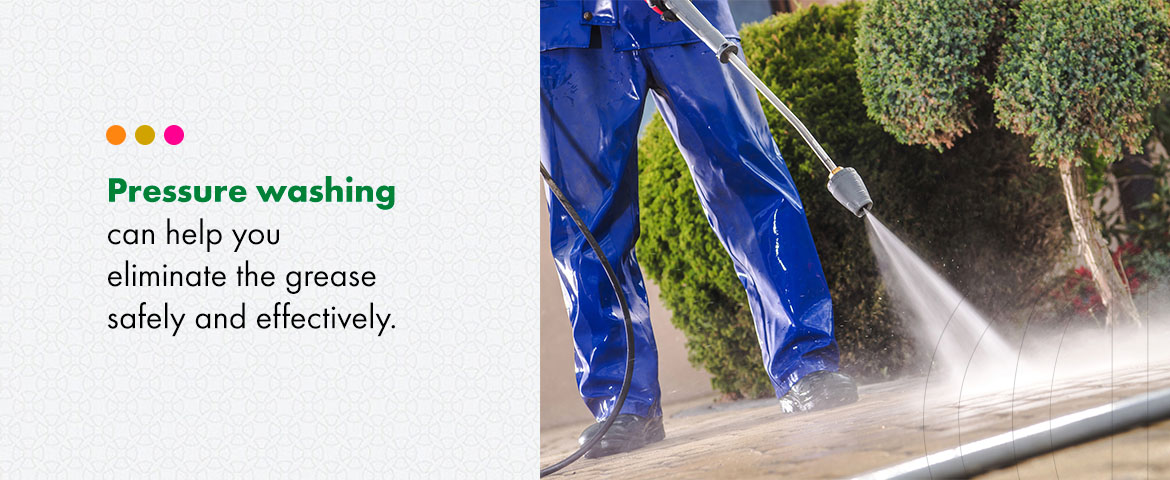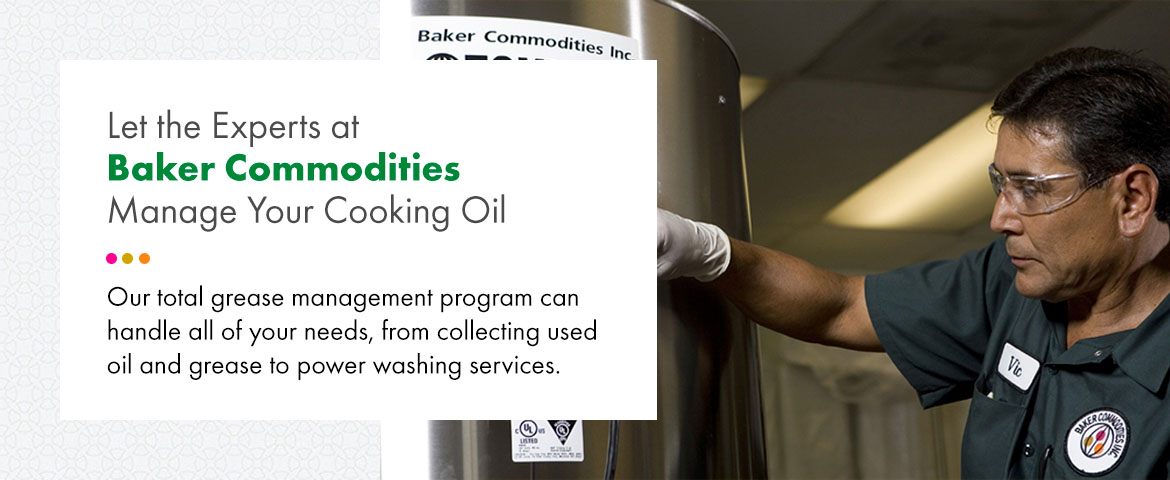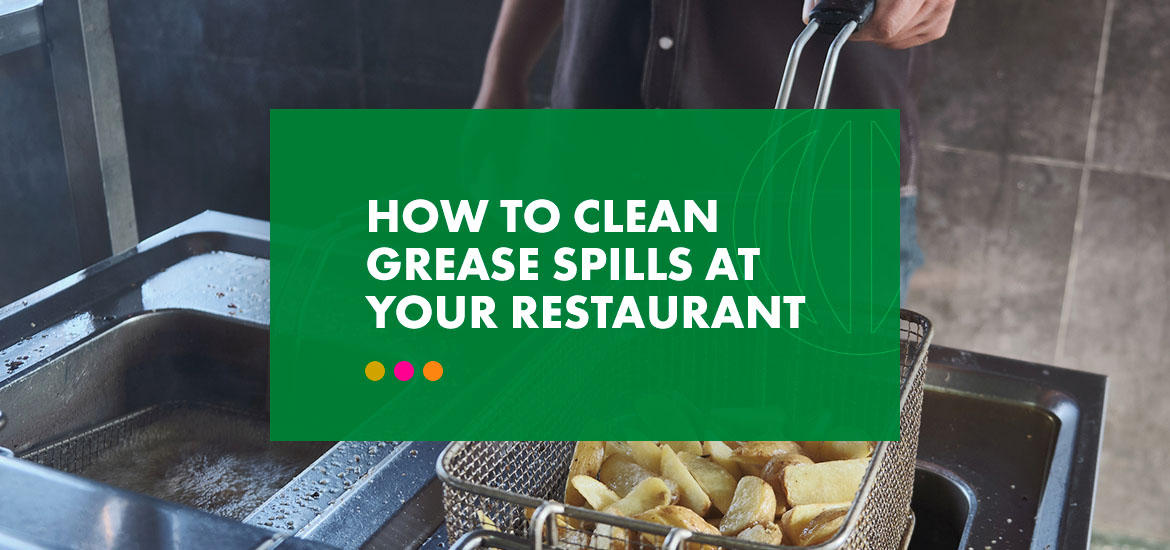How to Clean Grease Spills at Your Restaurant
Table of Contents:
- How to Clean Up a Grease Spill Inside the Kitchen
- Cleaning Up Grease Spills Outside
- Creating a Spill Prevention and Cleanup Plan
No matter how careful you might be, grease spills happen. Restaurants often require a large volume of grease to provide meals to their customers, and many have a designated bin to dump used cooking oil and grease. A recycling company will pump out the container regularly and take it to a location so professionals can turn it into something useful.
Even with a procedure like this, it can be challenging to keep grease and oil from spilling onto the ground or in the kitchen as employees carry it to the back. Grease and oil can become a hazard for employees and patrons, so cleaning up grease spills on the floor and outdoors is essential.
How to Properly Clean Up a Grease Spill In Your Restaurant
Cooking spills happen when you work in the restaurant industry, especially when using cooking oil frequently. If you’ve encountered a spill or are wondering if you’ve managed spills correctly in the past, here’s how to clean up cooking oil and grease in the kitchen:
1. Wait For it to Cool Before You Start Cleaning
If grease spilled in the kitchen, it likely came right out of a hot pan or fryer. The hot oil can be dangerous if you try to clean it right away. Hot oil can burn the skin, which can become painful and cause scarring. Instead, wait for the oil or grease to cool so you can clean it up without risking an injury.
2. Ensure the Your Staff is Taking Precautionary Steps
Before a grease spill clean up, you’ll want to ensure that your entire staff is aware of the spill and is taking the proper precautions for their safety.
First, you’ll want to block off the area where the oil or grease spilled. Regardless of whether the oil is hot or cold, the ground will be slippery, and if someone walks across it before it’s cleaned, they could fall and injure themselves. Each person in the kitchen should know exactly where the spill is located, especially if they weren’t there at the time of the spill.
If any glass breaks during the spill, ensure that your employees wear the proper footwear before they reenter the kitchen to prevent cuts or other injuries.
3. After Greases is Cooled, Start the Cleaning Process
Now that the oil or grease has cooled and your staff is safe, you can clean the spill. Your kitchen should already be equipped with everything you need, including old dishtowels, cornstarch, baking soda, soap and a mop. Here are the steps you can follow in cleaning up the spill:
Step 1: Start by using the dishtowels to dab at the spill, carefully soaking up the excess oil. You’ll want to soak up as much oil as possible to make the rest of the process easier.
Step 2: Use a generous amount of cornstarch, salt, sand, cat litter or baking soda to soak up any oil or grease that the towels couldn’t pick up. There are also special absorbent materials you can buy to absorb the oil. Once everything has been absorbed, use a dustpan to scoop up the remaining oil and substances, which should have clumped together. You can dispose of these materials in the trash rather than in your oil recycling bin.
Step 3: Now that you’ve cleaned up most of the grease or oil, mix warm water and soap and mop up the area. You can even use a soap made specifically for grease spills to guarantee it’s all cleaned. Ensure that all employees wait for the site to dry completely before resuming regular activities. As a note, you may want to keep a mop for exclusive use in grease spills so you don’t accidentally track grease on the floors when you are trying to clean up.
Restaurant cleaning procedures
Cleaning Up Grease Spills Outside
It’s common for some grease to spill on the ground while employees pour it into a recycling bin outside or, the company that collects your garbage might accidentally knock over your grease collection bin as they’re picking up your dumpster. These spills can pose hazards to the environment, so it’s essential to clean them as soon as possible.
You can use the same method that you would use in the kitchen to clean up spills on a smaller scale, but this becomes more difficult in an outdoor environment and isn’t suitable for larger spills. Instead, pressure washing can help you eliminate the grease safely and effectively.

Baker Commodities offers high-pressure power washing services to help you clean up grease spills outside. If you have a spill, pressure washing can easily remove the oil or grease and clean up your exterior. Our services also include full wastewater recovery, which means any water we use to pressure wash returns to our environmentally-friendly processing plant for proper cleaning and recycling.
Baker Commodities utilizes technologies of the highest quality to ensure we meet your cleanliness standards. Our trucks come equipped with state-of-the-art power washers designed to handle spills of any size. The hot water and intense water pressure from our pressure washers break down grease molecules and allow them to lift away from the concrete. Even if the grease has soaked into the concrete, the water pressure and heat will get the job done.
Creating a Spill Prevention and Cleanup Plan
Taking measures to prevent spills can save you time and effort. If you use grease or cooking oil often, use these tips to avoid spills:
- Use the proper storage containers: When you’re storing grease, it should only be in a leak-proof container with a tightly sealed lid. All containers should be in good condition and stored in a designated area. Regularly monitor and maintain these areas to ensure that the grease and oil are secure.
- Clean hood filters: Hood filters can collect grease, so you’ll want to ensure that you’re cleaning them regularly.
- Clean floor mats and equipment: Mats and equipment can collect grease as meals are prepared, so you’ll want to clean these regularly. Ensure you’re cleaning these items with a mop so a grease retention device can handle the wastewater.
- Recycle oil and grease: Oil and grease should never be poured down the drain since it can clog the system and result in fines or legal penalties. Instead, work with a company that can help you recycle your used grease and oil to prevent expensive maintenance and legal action.
You’ll also want to create a cleanup action plan to ensure that you’re prepared if a spill does occur. A cleanup plan includes:
- Procedures for cleanup and disposal
- Employee training
- Marked locations of grease storage areas and storm drains
- Contact information of agencies to call if you can’t handle the spill
- The contact information of the facility owner
Let the Experts at Baker Commodities Manage Your Cooking Oil

It can be challenging to manage your cooking oil, especially when running a successful business. Rather than finding ways to manage your cooking oil and grease independently, trust Baker Commodities to handle the work.
Our total grease management program can handle all of your needs, from collecting used oil and grease to power washing services. We can also help you clean grease trap and interceptor systems. You can choose from some or all of our services, and we’ll customize the perfect plan for you!
Contact or call up Toll Free at (855) 4-BAKER-0 today to learn more about our total grease management.



